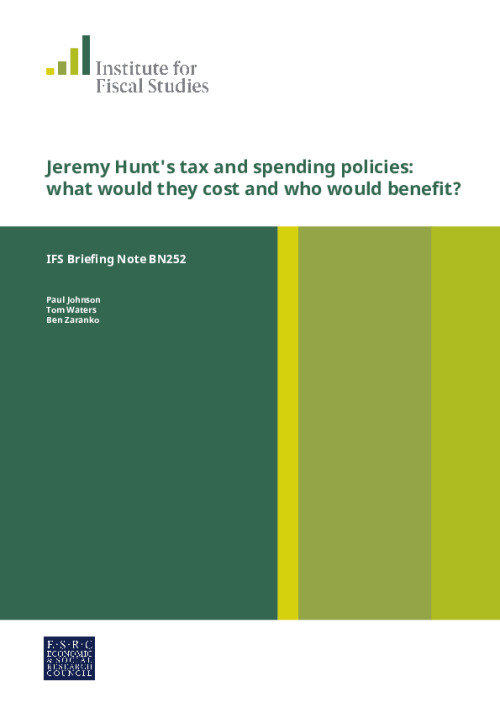Key findings
Jeremy Hunt has announced several policy proposals, including reducing corporation tax, increasing the point at which workers become liable for National Insurance (NICs) contributions, increasing defence spending, and reducing the interest rate applied to student debt. We find that:
- Cutting the main rate of corporation to 12.5% would cost around £13 billion per year in the short run, though probably somewhat less in the long run. This is not a tax cut that would pay for itself as some have claimed – our existing tax base is too big for it to be plausible that this loss of revenue could be made up a result of higher profits being reported in the UK. A cut of this scale would take the UK’s headline corporation tax rate to the second lowest in the OECD, alongside Ireland.
- Increasing the NICs threshold is a good way of helping low earners through the tax system, though using the tax credit system would be more effective and better targeted. Raising the threshold is expensive however, costing at least £3 billion per year for each £1,000 that it is raised. Raising it to the current income tax personal allowance of £12,500 would cost at least £11 billion per year and take 2.4 million workers out of NICs altogether.
- Increasing defence spending to 2.5% of national income over the next five years implies spending £15 billion more in 2023−24 than today, and around £12 billion more than if spending remained at its current level of 2% of national income. Doubling defence spending as a proportion of national income, as Mr. Hunt has previously mooted, would cost more than £40 billion per year. Any significant increase would represent a major reversal in a 70 year trend – a trend which has allowed for more spending on the welfare state, and especially on health, without significant tax rises.
- Cutting the rate of interest on student loans to just equal the RPI rate of inflation would cost very little in the short run and just over £1 billion in the long run. Because most students aren’t expected to pay back their loans in full, only around the highest earning 30% of graduates would benefit from such a policy. That said, the current system does mean high earners pay back more than the cost of their loan, providing an incentive for some families to pay up front.
- Mr. Hunt’s policies for higher spending and lower taxes would amplify the long-run challenges facing the UK public finances. The UK already faces considerable spending pressures from an ageing population and rising health care costs. Mr. Hunt’s combination of policy proposals would exacerbate these pressures and widen a gap in the public finances that will ultimately need to be filled through some combination of higher borrowing, tax increases or cuts to other areas of spending.











